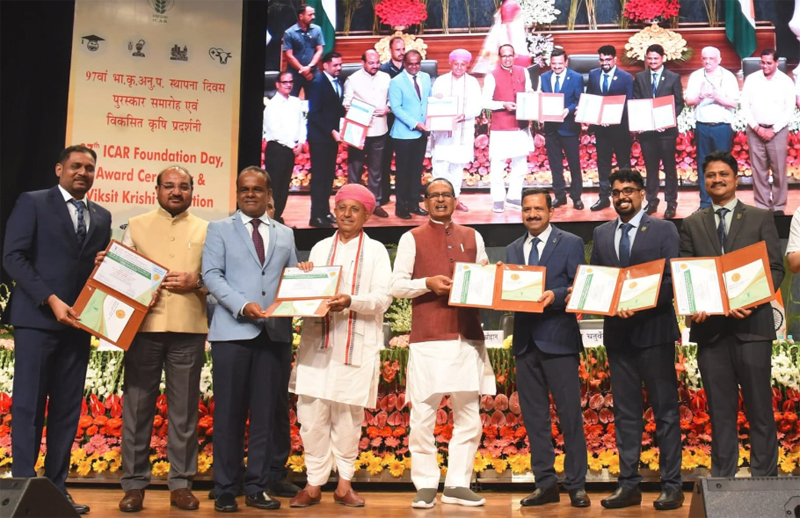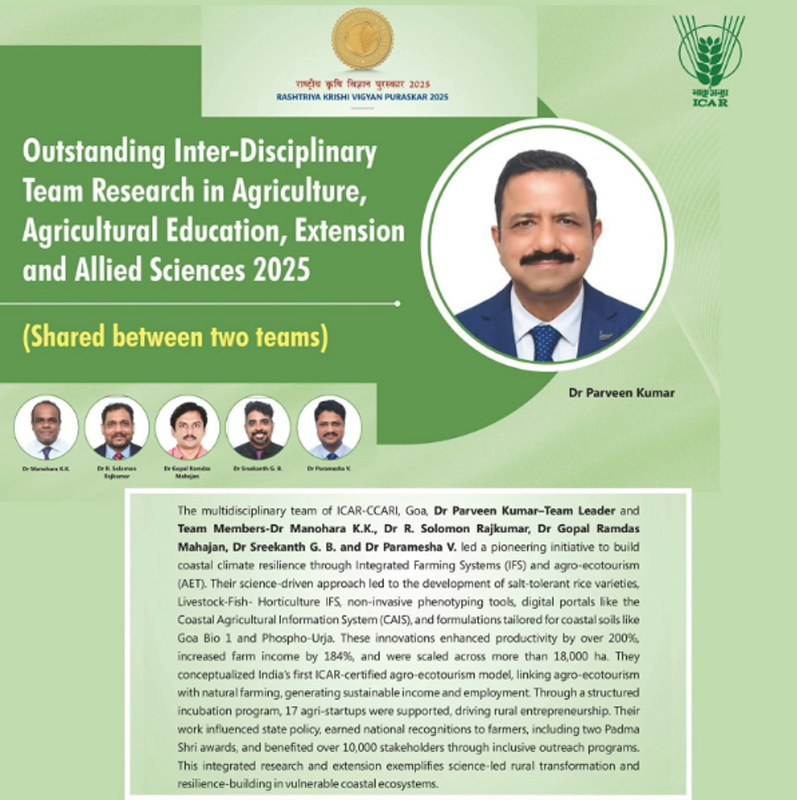
Scientists of ICAR-CCARI Goa Receive Rashtriya Krishi Vigyan Puraskar 2025 — Nation’s Highest Award in Agricultural Sciences
Scientists of ICAR-CCARI Goa Receive Rashtriya Krishi Vigyan Puraskar 2025 — Nation’s Highest Award in Agricultural Sciences
In a moment of immense pride for Goa and the Indian agricultural
research community, the ICAR-Central Coastal Agricultural
Research Institute (CCARI), Goa, has been conferred the
Rashtriya
Krishi Vigyan Puraskar 2025,
the highest national honour in Agricultural Sciences, by the
Indian Council of Agricultural Research (ICAR), DARE, Government
of India. The Hon’ble Union Minister of Agriculture, Shri
Shivraj Singh Chouhan Ji presented the award on the occasion of
the 97th ICAR Foundation Day on 16th July 2025 held in New
Delhi.
The award recognized ICAR-CCARI’s exceptional contribution in
the category of Outstanding Inter-Disciplinary Team Research in
Agriculture, Agricultural Education, Extension and Allied
Sciences. The award-winning concept of “Building Coastal Climate
Resilience through Integrated Farming Systems and
Agro-Ecotourism,” was a result of collaborative efforts led by
Dr. Parveen Kumar (Director,
ICAR-CCARI) and a team of accomplished senior scientists
including Dr. Manohara K. K., Dr. R. Solomon Rajkumar, Dr. Gopal
Ramdas Mahajan, Dr. Sreekanth G. B., and Dr. Paramesha V.
This pioneering initiative addresses the growing climate
vulnerabilities in coastal regions by designing and implementing
integrated and science-led solutions that ensure ecological
sustainability, farm profitability, and community empowerment.
The team adopted a holistic approach by combining Integrated
Farming Systems (IFS) and agro-ecotourism to deliver
transformative impacts in the coastal agro-ecosystem.
Their impactful research has led to the development of
salt-tolerant rice varieties, integrated farming system models,
and digital platforms such as the Coastal Agricultural
Information System (CAIS). They have also formulated
region-specific bio-inputs like Goa Bio 1 and Phospho-Urja,
tailored to the unique soil and salinity conditions of coastal
areas. These innovations led to an increase in productivity by
over 200% and an impressive 184% increase in farmer income. The
technologies were scaled across more than 18,000 farmers,
showcasing the scalability and adaptability of the models.
A landmark outcome of this work is India’s first ICAR-certified
agro-ecotourism model, which blends natural farming with
tourism, education, and entrepreneurship. The model is designed
to boost rural livelihoods and spread awareness on sustainable
agricultural practices among visitors. This effort is further
amplified through a structured incubation program that supported
17 agri-startups, fostering a culture of innovation and rural
enterprise.
The team’s outreach efforts reached over 10,000 stakeholders,
including farmers, policymakers, and NGOs. Their inclusive
approach ensured that the research's benefits reached tribal
communities and women farmers, contributing to social equity.
Significantly, two of the farmers associated with the program
were honoured with the Padma Shri, a testimony to the research's
grassroots impact.
Recently, in recognition of these transformative efforts, the
Hon’ble Chief Minister of Goa, Dr. Pramod Sawant, during the “11
Saal—Sankalp Se Siddhi” celebration marking 11 years of
transformative governance, publicly acknowledged the
contributions of ICAR-CCARI in front of the Goa Cabinet. The
Chief Minister lauded the institute’s vital role in
strengthening the state’s agricultural resilience, innovation,
and grassroots outreach.
Commenting on the recognition, Dr. Parveen Kumar stated,
“This honour belongs to the entire team and the farming
communities who partnered with us on this journey. It reinforces
our commitment to science-based, farmer-centric solutions for a
resilient coastal India.”
This award places ICAR-CCARI among the leading agricultural
research institutions in the country and serves as a beacon for
future-ready, climate-smart innovations tailored to coastal
agro-ecosystems.
 |
 |
|
|
|